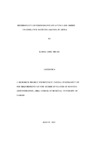| dc.description.abstract | The objectives of the study were to establish the determinants of financial performance of SACCOs in Kenya and the challenges experienced in SACCO sector of the economy. The significance of this study is that recommendations made to government policy makers and management of co-operative societies, if implemented would enhance financial management and general performance of the SACCO sector through sound financial management practice.
The research design adopted was a survey of determinants of performance of SACCO in Kenya and the study was limited to 3,990 credit unions/SACCOS. The design was appropriate as a sample of thirty five SACCOS operating within Nairobi province and have subscribed to Nairobi telephone directory 20 I 0 was randomly selected and studied. The study was also based on data published from the audited annual reports of the SACCOs and covered a period of 5 years between 2004 and 2008 and primary data was compiled and analyzed from a survey questionnaire which was developed and circulated to SACCO'S general managers and chief executives entailing all questions on factors determing performance.
The study used both primary and secondary data. Raw data collected from the completed questionnaires was edited and coded to facilitate statistical analysis. Quantitative data collected was analyzed by use of descriptive statistics using SPSS version 17 and presented through percentages, means, standard deviations and frequencies with the key independent variable being Return on Assets (ROA) that is, EBfT divided by the book value of assets, and Return on Book equity (ROE) which is net income divided by book value of equity.
The study found out that demand for loans as a variable affecting ROA was considered as most variable determing financial performance with a mean score of 5.94. Other key determinants in order of variability were as follows; capital adequacy mean of 5.91, competition from other institutions mean of 5.55, infrastructure management and oversight mean score of 5.54, while quality pay and corporate tied with a mean score of 5.48, Organizational and structural issues mean score of 5.47 inadequate legal reforms mean score of 5.22, Government interference mean score of 5.2, planning and education of members mean score of 5.14 , Lack of financial standards mean score of 4.94.
The study recommends that Government policy makers should formulate a policy that make it mandatory for all SACCOS to prepare and have in place a strategic plan that guides the direction of all management actions. The study also recommend that the ministry of co-operatives should launch a campaign aimed at recruiting more members for the societies with low membership in order to make them strong and at the same time intensify supervision of the management of the giant societies to ensure proper financial management and hence enhanced benefits to members.
This study also suggests that a further research be carried out to establish how members of some SACCOS managed to maintain high membership savings despite the hard economic times and global crisis prevailing in the country at the time of the study. The skills and knowledge should be imparted to those SACCO members whose savings was low in order to encourage them to save more in future. | en_US |

